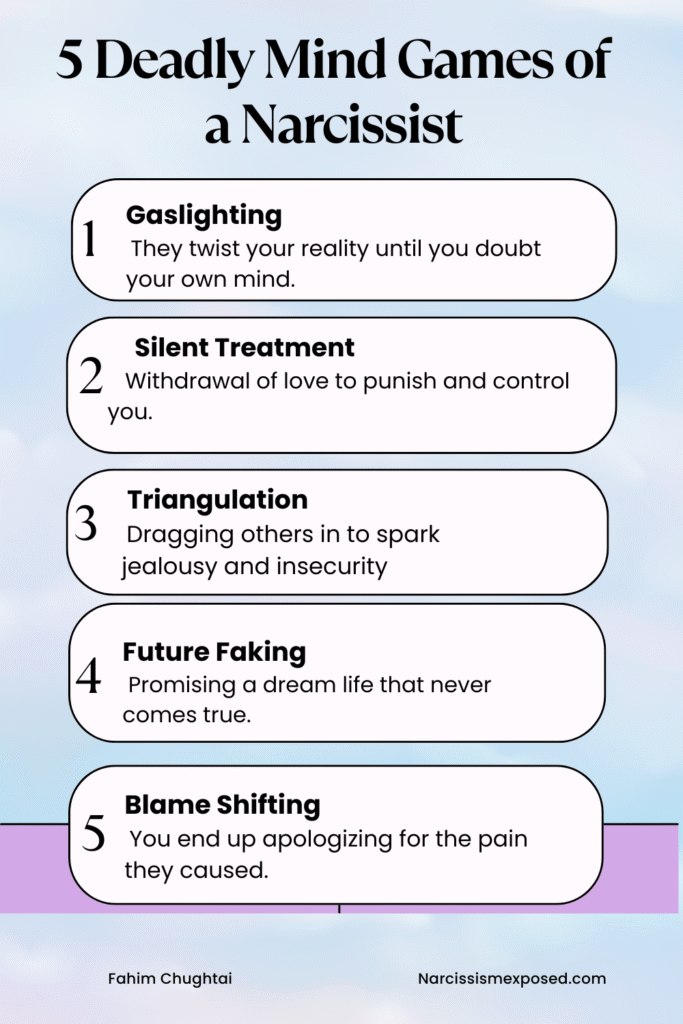The subtle art of manipulation often goes unnoticed until the damage is done. In relationships with narcissists, the ground beneath your feet can feel like shifting sand, leaving you questioning your own reality and judgment. Understanding these manipulation tactics isn’t just about protecting yourself—it’s about reclaiming your psychological freedom and emotional well-being.
In this comprehensive guide, we’ll delve deep into the psychology of narcissistic manipulation, exploring five sophisticated tactics that narcissists employ to maintain control over their victims. Whether you’re currently in a relationship with someone you suspect might be a narcissist, healing from past narcissistic abuse, or simply wanting to protect yourself from future manipulation, this knowledge will serve as your psychological armor.
What makes these manipulation tactics particularly dangerous is their gradual nature. Like a slowly heating pot of water, victims often don’t realize they’re in danger until they’re already deeply affected. By understanding these patterns, you’ll be able to recognize the warning signs before you’re caught in the web of manipulation.
We’ll examine:
- How gaslighting erodes your grip on reality
- The devastating cycle of idealization, devaluation, and discarding
- How triangulation creates artificial competition in relationships
- The addictive nature of intermittent reinforcement
- The empty promises of future faking and their impact on your present life
Let’s unravel these complex psychological tactics together and build a foundation for healthier relationships.

1. Gaslighting: Making You Question Your Reality

Let’s dive into one of the most insidious mind games a narcissist plays: gaslighting. You know that gut feeling when something feels off, but someone you trust keeps telling you you’re wrong? That’s often where gaslighting begins.
Imagine this scenario: You clearly remember making plans with your partner for dinner at 7 PM. When they don’t show up until 9 PM, they insist with absolute conviction that you agreed on 9 PM. Not only that, but they remind you of how you’ve been ‘so forgetful lately.’ That seed of doubt they’ve planted? That’s gaslighting in action.
Here’s why this tactic is so devastatingly effective: Narcissists don’t start with big lies. They begin with tiny distortions of reality — small enough that questioning them makes you seem unreasonable. It might start with phrases like ‘You’re too sensitive’ or ‘That’s not what happened at all.’ They’ll say these things with such confidence that you begin to question your own memory.
Let me share some common phrases narcissists use during gaslighting. You might hear: ‘You’re imagining things,’ ‘I never said that — you must have dreamed it,’ or ‘You’re twisting my words again.’ They might even tell others you’re ‘emotionally unstable’ or ‘prone to exaggeration,’ creating a network of doubt around your credibility.
This constant reality distortion creates a form of emotional dependency. When you can no longer trust your own perceptions, you start relying on the narcissist to tell you what’s ‘real.’ It’s like being in a house of mirrors where every reflection is slightly warped, and only they claim to know which one is true.
The psychological impact runs deep. Victims often experience anxiety, depression, and a profound loss of self-trust. Many describe feeling like they’re ‘going crazy.’ The cruel irony? By the time you realize you’re being gaslighted, your self-confidence has often been so eroded that you doubt even this realization.
Here’s what makes gaslighting particularly hard to recognize: it happens gradually. Like a fog rolling in, it clouds your judgment so slowly that by the time your visibility is completely compromised, you’ve already forgotten what a clear day looks like.
Remember: if you’re experiencing this, you’re not losing your mind. Your memories and perceptions are valid. Gaslighting works because good people don’t expect others to deliberately distort reality. Your willingness to consider that you might be wrong isn’t a weakness — it’s a quality that narcissists exploit.
But now that you understand how this manipulation works, you’ve taken the first step toward reclaiming your reality. In our next section, we’ll explore another powerful tactic narcissists use to maintain control…
2. The Idealize-Devalue-Discard Cycle

Now let’s explore one of the most psychologically devastating patterns in narcissistic relationships: the idealize-devalue-discard cycle. Picture the most incredible romance you can imagine — where someone seems to understand you completely, shares all your dreams, and makes you feel absolutely incredible. That’s exactly how this cycle begins, and understanding it could save you years of emotional pain.
The cycle starts with what psychologists call ‘love bombing.’ During this phase, the narcissist showers you with attention, affection, and what feels like pure, unconditional love. They’ll text you constantly, plan elaborate dates, and make you feel like you’ve finally found your soulmate. They might say things like ‘I’ve never met anyone like you’ or ‘You understand me in a way no one else does.’ This phase is intoxicating because it taps into our deepest desires to be seen, understood, and cherished.
But watch carefully, because the devaluation phase creeps in subtly. It often starts with small criticisms disguised as helpful suggestions: ‘You’d look so much better if you dressed differently’ or ‘Why can’t you be more like [someone else]?’ The compliments that once flowed freely become rare and conditional. The person who once thought you were perfect now seems impossible to please. This shift is calculated — it usually begins once the narcissist feels you’re emotionally invested enough to tolerate poor treatment.
The timing of this cycle isn’t random. Narcissists are masters at understanding human psychology. They know exactly when to pull back (right when you’re feeling secure), when to offer hope (just as you’re about to leave), and when to push harder (when you show signs of independence). It’s like a twisted dance where they’re always two steps ahead, anticipating your emotional responses.
You might wonder why anyone would stay in such a painful situation. The answer lies in a phenomenon called ‘intermittent reinforcement.’ Those occasional moments when the narcissist returns to their loving behavior create a powerful psychological addiction. You find yourself constantly working to get back to that magical beginning phase, convinced that if you just try hard enough, that ‘perfect’ person will return permanently.
Each phase serves a specific purpose in maintaining control. The idealization phase creates an emotional high point that you’ll constantly try to reach again. The devaluation phase erodes your self-worth, making you more dependent on the narcissist’s approval. And the discard phase — whether temporary or permanent — reinforces your fear of abandonment, making you more likely to accept poor treatment when they return.
Here’s what makes this cycle particularly insidious: it can repeat multiple times, with each iteration leaving deeper emotional scars. The narcissist might suddenly reappear with grand apologies and promises of change, reigniting hope and restarting the cycle. This pattern can continue for years unless you recognize it for what it is — a deliberate manipulation tactic.
Understanding this love bombing cycle is crucial because it helps you see that the initial idealization phase, as wonderful as it felt, wasn’t real love — it was a calculated first step in an emotional manipulation strategy. Real love grows steadily and feels secure. It doesn’t swing wildly between extremes of adoration and contempt.
Let’s move on to our next tactic, where we’ll explore how narcissists use other people as pawns in their manipulation games…
3. Triangulation: Creating Invisible Rivals

Let’s talk about one of the most subtle yet powerful manipulation tactics in a narcissist’s arsenal: triangulation. You might have experienced this if you’ve ever felt like there was an invisible third person casting a shadow over your relationship. There’s a reason for that feeling, and understanding it could completely change how you view relationship dynamics.
Think of triangulation like a puppet master adding a third string to make their puppet dance exactly how they want. The narcissist introduces another person into the dynamic — sometimes real, sometimes exaggerated, and sometimes completely fabricated — to create a specific emotional response in you.
Here’s how it typically works: A narcissist might casually mention how their ex ‘still reaches out to them all the time,’ or how a coworker ‘keeps flirting with them at work.’ They’ll tell you just enough to plant a seed of doubt, but never enough for you to fully understand the situation. It’s like they’re dangling a mystery just out of your reach.
What makes triangulation different from normal jealousy is its deliberate and systematic nature. Normal jealousy happens organically and is usually based on real situations. Triangulation, on the other hand, is carefully orchestrated. The narcissist strategically introduces these third parties at specific times — often when you’re feeling most secure in the relationship or when they want to regain control.
Let me share some common triangulation tactics you might recognize. A narcissist might:
- Leave their phone visible with mysterious text notifications
- Talk about how their ex ‘still understands them better than anyone’
- Constantly bring up how someone at work ‘really gets their vision’
- Compare you unfavorably to friends or family members
- Share stories about people who are romantically interested in them
- Keep photos or mementos from past relationships prominently displayed
The psychological impact of this constant triangulation runs deep. You start feeling like you’re constantly competing for the narcissist’s attention and affection. Your sense of security erodes as you wonder if you’re being compared to others. You might find yourself trying harder to prove your worth or walking on eggshells to avoid having them seek comfort from these other sources.
This manipulation maintains control through uncertainty. When you’re busy worrying about potential rivals, you’re less likely to notice other forms of manipulation. You become focused on ‘winning’ against these perceived competitors rather than questioning why you’re being made to compete in the first place.
The uncertainty also keeps you in a constant state of emotional arousal. You never quite know where you stand or who else might be in the picture. This creates a form of hypervigilance where you’re always watching for signs of these other people or trying to measure up to invisible standards.
Here’s what makes triangulation particularly effective: it plays on our natural instinct to fight for important relationships. The narcissist knows that by creating a sense of competition, they can keep you engaged and working hard to maintain your position in their life. It’s like being in a race where the finish line keeps moving, and you’re running against shadows.
Understanding triangulation is crucial because once you recognize it, you can see it for what it is — a manufactured drama designed to keep you insecure and compliant. Real, healthy relationships don’t involve constant competition or mysterious third parties lurking in the background.
Let’s move on to our next tactic, where we’ll explore how narcissists use something even more powerful than rivalry to keep you hooked…
4. Intermittent Reinforcement
Now we’re going to explore one of the most psychologically powerful tactics narcissists use: intermittent reinforcement. Imagine sitting at a slot machine, watching the wheels spin. Sometimes you win, sometimes you lose, but you can’t stop pulling that lever. The same psychological mechanism that keeps gamblers coming back is actively used in toxic relationships, and understanding how it works could help you break free from its grip.
The science behind this manipulation tactic is fascinating and well-documented. When rewards or affection come at unpredictable intervals, our brains produce higher levels of dopamine — the same neurotransmitter involved in addiction. It’s like our emotional reward system gets hijacked. The uncertainty of when we’ll receive love, attention, or approval actually makes us more invested, not less.
Think about a normal, healthy relationship. Affection and support flow consistently and predictably. But in a relationship with a narcissist, these moments of warmth and connection become random and unpredictable. One day they’re incredibly loving and attentive, the next they’re cold and distant — and there’s no way to predict which version of them you’ll encounter.
This inconsistency creates a stronger emotional bond than constant affection would. It seems counterintuitive, but when you never know if you’ll get emotional nourishment or emotional starvation, you become hypervigilant about earning those precious moments of connection. It’s like being in an emotional desert — when you’re dying of thirst, even a few drops of water feel like a feast.
Narcissists time their positive attention with surgical precision. They learn exactly when to offer warmth to keep you hoping and exactly when to withdraw it to keep you desperate. Just when you’re about to give up, they’ll show you a glimpse of the person you fell in love with. They might surprise you with an incredibly thoughtful gesture or suddenly become the attentive partner you’ve been missing. These moments aren’t random — they’re calculated to maintain control.
The connection to addiction patterns in the brain is striking. Research shows that intermittent reinforcement activates the same neural pathways as substance addiction. Your brain literally becomes addicted to the highs and lows of the relationship. You find yourself constantly checking your phone, analyzing their behavior, and trying to figure out what you did ‘right’ during the good times so you can repeat it.
Here’s how to recognize this pattern in your relationships. Watch for these signs:
- You feel intense relief when they show you affection
- You’re constantly trying to ‘earn’ their love or approval
- Good moments feel euphoric but never last
- You find yourself remembering and replaying their rare moments of kindness
- You’re always trying to get back to how things were ‘in the beginning’
- You feel anxious when things are going well, waiting for the other shoe to drop
What makes this manipulation so effective is that it creates a trauma bond — a psychological attachment formed through repeated cycles of abuse and reinforcement. The rare moments of kindness feel so precious that you become willing to endure increasingly poor treatment just to experience them again.
Understanding intermittent reinforcement is crucial because it explains why leaving toxic relationships can be so difficult. It’s not just about emotions or love — you’re literally fighting against a biochemical addiction in your brain. But here’s the empowering part: once you recognize this pattern, you can start to see those ‘magical’ moments of affection for what they really are — calculated doses of psychological manipulation designed to keep you hooked.
Let’s move on to our final tactic, where we’ll explore how narcissists use promises of a perfect future to keep you trapped in an imperfect present…
5. Future Faking: The Empty Promises Trap
Let’s explore one of the most deceptive tactics in the narcissist’s playbook: future faking. Have you ever wondered why someone would spend countless hours planning an elaborate future they have no intention of creating? The answer reveals a manipulation strategy so subtle that many people don’t realize they’re caught in it until years have passed.
Future faking works because it taps into our deepest hopes and dreams. The narcissist becomes an architect of fantasies, sketching out detailed plans for a life that seems perfect. They might describe the house you’ll buy together, plan the names of your future children, or map out incredible career ventures you’ll pursue as a team. These aren’t just casual mentions — they paint vivid pictures of a future so compelling that it feels almost real.
The psychology behind these grand promises is fascinating. When narcissists make these elaborate plans, they’re not just lying — they’re creating an emotional investment. Think of it like a down payment on a dream. Each time they add a new detail to this fictional future, you become more emotionally invested in making it real. You start making decisions based on this promised future, adjusting your life plans to align with their vision.
These future promises often follow specific patterns. A narcissist might talk about:
- The perfect home you’ll build together once they get their upcoming promotion
- The romantic wedding they want to plan… after they sort out some unnamed issues
- The business you’ll start together when the timing is right
- The family you’ll have once everything settles down
- The amazing places you’ll travel… someday
- The lifestyle changes they’ll make… eventually
The timing of these promises is particularly cruel. They often come right after moments of disappointment or conflict. Just when you’re ready to give up hope, they’ll unveil an even grander vision of the future. It’s like they’re saying, ‘Don’t focus on today’s pain — look at tomorrow’s promise instead.’
The real reason behind these delayed gratification tactics is control. By keeping you focused on a beautiful future, they distract you from the painful present. It’s like having someone point at a gorgeous mirage while they pick your pocket. You’re so busy looking at the illusion that you don’t notice what’s happening right now.
The impact on victims is profound and far-reaching. When you’re caught in future faking, your ability to plan your own life becomes paralyzed. You might:
- Put off career opportunities because they don’t fit the narcissist’s ‘shared vision’
- Delay personal goals while waiting for their promises to materialize
- Miss out on real relationships while waiting for the fake future to arrive
- Lose touch with your own dreams as you become invested in theirs
- Waste years waiting for ‘the right time’ that never comes
What makes future faking particularly devastating is how it steals time — our most precious and non-renewable resource. While you’re waiting for their promises to materialize, real opportunities pass by. It’s like being stuck in a waiting room while life happens outside.
Here’s the crucial thing to understand: narcissists aren’t necessarily lying when they describe these futures. In the moment, they might genuinely believe in these plans. But their promises are based on idealized versions of themselves they can’t sustain. It’s like writing checks against an empty account — the intention might feel real, but there’s nothing to back it up.
Understanding future faking is essential because it helps you distinguish between genuine plans and empty promises. Real plans have concrete steps, specific timelines, and consistent progress. They don’t exist solely in conversations about ‘someday.’ If someone’s promises always live in the future but never arrive in the present, you’re likely experiencing future faking.
The most empowering realization is that your future doesn’t have to be held hostage by someone else’s empty promises. You can start building your own reality right now, based on actions rather than words.






